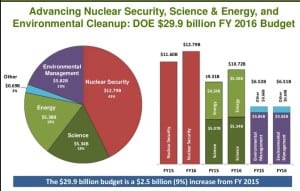Trump’s Pick for Energy Department: Rick Perry
President-elect Donald Trump has picked former Texas governor Rick Perry to be his energy secretary, according to multiple reports.
The New York Times said on Tuesday (Dec.13) that Trump offered Perry the job on Monday evening and Perry accepted. The newspaper said a formal announcement will come later today.
Perry, 66, was Texas governor from 2000 to 2015, the longest term in the state’s history. He ran for the GOP presidential nomination in the 2012 and 2016 election cycles.
![Governor of Texas Rick Perry at Southern Republican Leadership Conference, Oklahoma City, OK May 2015. By Michael Vadon (Own work) [CC BY-SA 4.0 (http://creativecommons.org/licenses/by-sa/4.0)], via Wikimedia Commons](https://www.powermag.com/wp-content/uploads/2016/12/governor_of_texas_rick_perry_at_southern_republican_leadership_conference_oklahoma_city_ok_may_2015_by_michael_vadon_18-300x200.jpeg)
Perry was governor of an important oil- and gas-producing state (although renewables, particularly wind, thrived during his gubernatorial term). It’s likely he will try to focus on fossil fuels at the DOE.
But that focus may not produce great results, despite the agency’s 2017 budget request of $32 billion. As the Washington Post commented when Perry’s appointment surfaced: “Despite its name, most of the Energy Department’s budget is devoted to maintaining the nation’s stockpile of nuclear warheads and to cleaning up nuclear waste at sites left by military weapons programs. The department runs the nation’s national laboratories, sets appliance standards and hands out grants and loan guarantees for everything from basic research to solar cells to capturing carbon dioxide from coal combustion.” The National Nuclear Security Administration, the nation’s nuclear weapons program, gets $13 billion of the 2017 budget.

The Interior Department is far more central to energy production, including oil, gas, and coal leasing on public lands.
The DOE is primarily a science agency. The Obama administration recognized that. Obama’s first energy secretary was Steven Chu, a Nobel Prize–winning physicist (1997) and head of the DOE’s Lawrence Berkeley National Laboratory. The second Obama energy secretary was Ernest Moniz, another physicist, who ran an energy policy program at the Massachusetts Institute of Technology.
Perry would not be the first energy secretary who had proposed abolishing the agency. George W. Bush’s first energy secretary was former Michigan Republican Sen. Spencer Abraham (2001-2005). In 1999, when he was in the Senate, Abraham introduced legislation to kill the DOE. Once in office at the agency, he changed his mind.
Commenting on the nomination, Jennifer Layke, head of the World Resources Institute’s energy program, highlighted the progress on renewables when Perry was governor: “Governor Perry comes from a state long-associated with the oil industry, but he also has a successful track record of promoting wind power. When Perry took office as governor, Texas had 116 megawatts of wind power, but it now boasts 18,000 megawatts, making it the country’s largest wind producer. If the incoming secretary truly wants to boost America’s economy, health and security, he should look no further than extending the department’s commitment to clean, renewable energy.”
Harsh commentary came from Gene Karpinsky at the League of Conservation Voters. He said, “There is no doubt that Rick Perry is completely unfit to run an agency he sought to eliminate—and couldn’t even name. Perry is a climate change denier, opposes renewable energy even as it has bloomed in Texas, and doesn’t even believe CO2 is a pollutant.”
Jim Matheson, head of the National Rural Electric Cooperative Association, said, “We value DOE as an important partner in our pursuit of innovative solutions to our nation’s energy challenges—particularly in the areas of cybersecurity, carbon capture, renewable energy, and the development of electric utility infrastructure. We look forward to working with Gov. Perry, once confirmed, to meet the energy challenges of the future.”
Perry, elected lieutenant governor in 1998, became governor when then-governor George W. Bush left for the White House in December 2000. Before that, Perry was the state’s agriculture commissioner, also a statewide elected office. His first foray into politics was election to the state legislature as a Democrat in 1984. He became a Republican in 1990, when he ran for agriculture commissioner. His background is agriculture, with a degree in animal science from Texas A&M University.
—Kennedy Maize is a long-time energy journalist and frequent contributor to POWER.